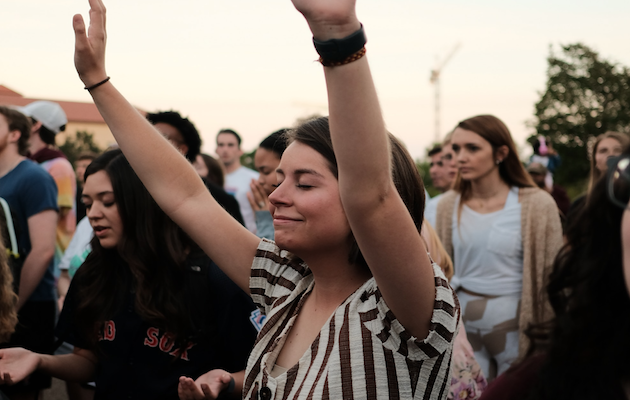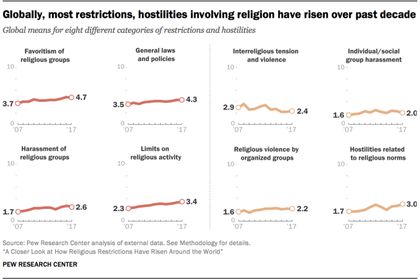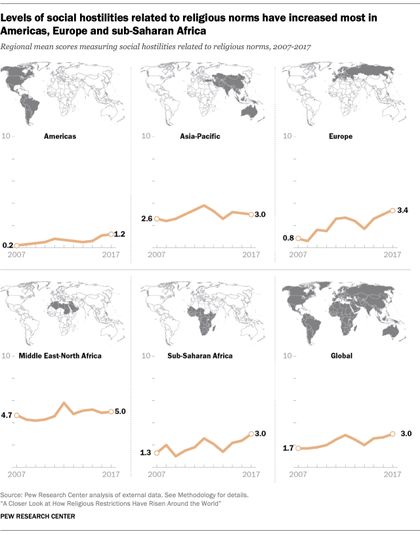According to a Pew Research survey, “52 countries impose high levels of restrictions on religion, up from 40 in 2007”. Social hostilities have grown even more.
 Europe in the second region in the world with more social hostilities against religion. / Cason Asher, Unsplash CC
Europe in the second region in the world with more social hostilities against religion. / Cason Asher, Unsplash CC
The number of countries that have increasingly issued restrictive policies, as well as the social hostilities against religion has grown in the last decade, a recent Pew Research survey shows.
GOVERNMENT RESTRICTIONS
“Over the decade from 2007 to 2017, government restrictions on religion – laws, policies and actions by state officials that restrict religious beliefs and practices – increased markedly around the world”, the study says.
The latest data from 2017, “shows that 52 governments impose either high or very high levels of restrictions on religion, up from 40 in 2007”.
“Laws and policies restricting religious freedom (such as requiring that religious groups register in order to operate) and government favouritism of religious groups, have consistently been the most prevalent types of restrictions globally”, researchers point out.
On the other hand, “levels of government limits on religious activities and government harassment of religious groups are somewhat lower. But they also have been rising over the past decade”
In fact, “the average score for government limits on religious activities in Europe has doubled since 2007, and the average score for government harassment in the Middle East-North Africa region has increased by 72%”.
 Government restrictions and social hostilities against religion have increased worldwide. / Pew Research.
Government restrictions and social hostilities against religion have increased worldwide. / Pew Research.
SOCIAL HOSTILITIES
Meanwhile, “the number of countries where people are experiencing the highest levels of social hostilities involving religion has risen even more over the course of the study, from 39 to 56”.
The research analysed four categories of social hostilities: hostilities related to religious norms, inter-religious tension and violence, religious violence by organized groups, and individual and social group harassment.
“Hostilities related to religious norms is the category that has increased substantially, while the harassment by individuals and social groups and the religious violence by organized groups have risen more modestly […] and inter-religious tension and violence has declined markedly since 2007”, the study explains.
OVERALL VIEW
According to Pew, “in general, religious restrictions have been rising around the world for the past decade, but they have not been doing so evenly across all geographic regions or all kinds of restrictions”.
“The level of restrictions started high in the Middle East-North Africa region, and is now highest there in all eight categories measured by the study”, they add.
 Social restrictions related to religious norms. / Pew Research.
Social restrictions related to religious norms. / Pew Research.
EUROPE, ABOVE THE AVERAGE IN SOCIAL HOSTILITIES
However, “some of the biggest increases over the last decade have been in other regions, including Europe and sub-Saharan Africa, where some groups have tried to impose their religious norms on others through kidnappings and forced conversions”.
The research shows that government limits on religious activities, religious violence by organized groups, and government harassment of religious groups has grown in Europe.
But, of all the categories analyzed, the one that stands out most is the hostilities related to religious norms , which has increased from 0.8% in 2007 to 3.4% in 2017, exceeding the global average, of 3%, and being the second region with higher values in this category, only behind the Middle East and North Africa.
These hostilities mostly come from Eastern Europe countries, but the research also points out that “several Western European countries rank among those with the highest scores in the category of social hostilities related to religious norms”.
“In Germany, for instance, religious groups reportedly used refugees’ fear of deportation to promote conversions, according to the U.S. State Department’s annual report on religious freedom, and in France, Jehovah’s Witnesses faced violence when proselytizing”, they said.

Las opiniones vertidas por nuestros colaboradores se realizan a nivel personal, pudiendo coincidir o no con la postura de la dirección de Protestante Digital.
Si quieres comentar o